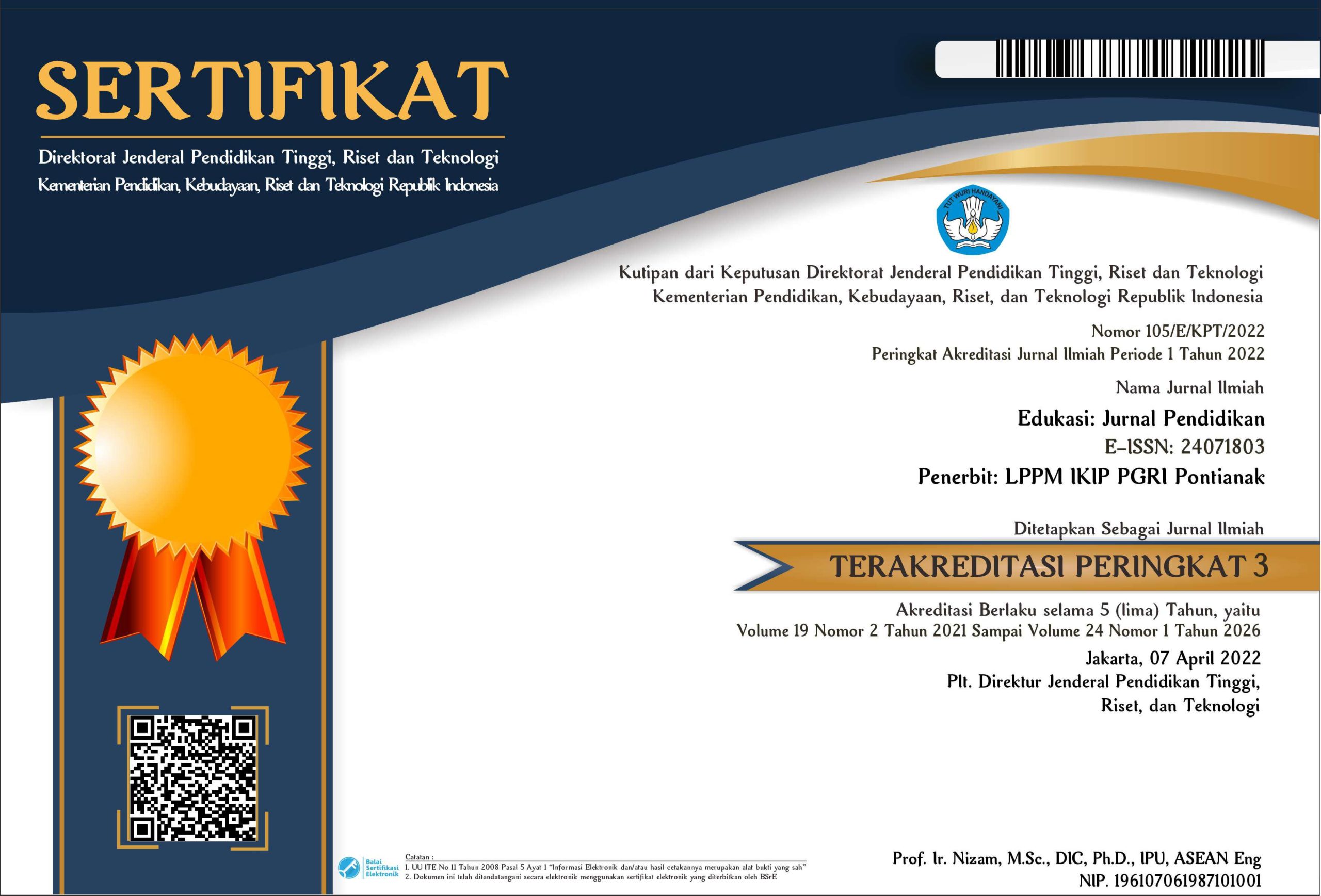PENGARUH MODEL LEARNING CYCLE 5E DENGAN E-LKPD BERBASIS MULTIREPRESENTASI TERHADAP SCIENTIFIC REASONING SISWA SMP
DOI:
https://doi.org/10.31571/edukasi.v21i2.6027Keywords:
learning cycle 5E; multirepresentation; worksheet; scientific reasoningAbstract
Scientific reasoning is one of the important skills students and graduates need today. Scientific reasoning is part of high-level thinking skills and is one of the skills required in school curriculum implementation. Even though it is an important skill, research data shows that students' scientific reasoning is still unsatisfactory. The purpose of this study is to examine how junior high school students' scientific reasoning is affected when the 5E learning cycle model and multi-representation-based E-LKPD are used to execute learning. The study was carried out during the even semester of the 2022–2023 school year at SMP Negeri 2 Panti. Students in classes IX B and IX E served as the research samples, while all IX students comprised the study's population. The study used the quasi-experimental design method in conjunction with a quantitative methodology. Examinations, observations, interviews, and documentation were used to gather research data. Research data was analyzed by applying several tests, including the N-gain test, the normality test using Shapiro-Wilk, and the independent sample t-test. The research results show that implementing the 5E learning cycle model using multi-representation-based E-LKPD positively influences and impacts the scientific reasoning of students.
Downloads
References
Aini, N., Subiki, & Supriadi, B. (2018). Identifikasi kemampuan penalaran ilmiah (scientific reasoning) siswa SMA di Kabupaten Jember pada pokok bahasan dinamika. Prosiding Seminar Nasional Pendidikan Fisika 2018.
Anjani, F., Supeno, & Subiki. (2020). Kemampuan penalaran ilmiah siswa SMA dalam pembelajran fisika menggunakan model inkuiri terbimbing disertai diagram berpikir multidimensi. Lantanida Journal, 8(1), 1-95
Antika, I. A., Supeno, & Wahyuni, D. (2022). Pengaruh model problem-based learning disertai LKPD berbasis multirepresentasi pada pembelajaran IPA terhadapscientific reasoning skills siswa SMP. LENSA (Lentera Sains): Jurnal Pendidikan IPA, 12(2), 97–104.
Balqis, D., Kusairi, S., & Supriana, E. (2019). Analisis Kemampuan Penalaran Ilmiah pada Pembelajaran Interactive Demonstration disertai Formative Assessment. Jurnal Pendidikan: Teori, Penelitian, dan Pengembangan, 4(11), 1485– 1490.
Djabba, R., Mukhlisa, N., & Utami, D. P. (2021). Penerapan model learning cycle pada pembelajaran tema 3 tentang sistem pencernaan pada hewan untuk meningkatkan hasil belajar siswa kelas V SD Inpres Banga banga Kabupaten Barru. Jurnal Publikasi Pendidikan, P-ISSN 2088-2092 e-ISSN 2548-6721.
Hake, R. R. (1998). Interactive engagement versus traditional methods: a six-thousand-student survey of mechanics test data for introductory physics courses. American Journal of Physics, 66(1), 64–74.
Handayani, G. A., Windyariani, S., & Yanuar Pauzi, R. (2020). Profil tingkat penalaran ilmiah siswa sekolah menengah atas pada materi ekosistem. BIODIK, 6(2), 176–186.
Hanson, S. (2016). The assessment of scientific reasoning skills of high school science students: a standardized assessment instrument. Theses and Dissertations. America: Illinois States University.
Indahsari, S. N., Supeno, & Maryani. (2020). Student worksheet based on inquiry with vee map to improve students’ scientific reasoning ability in physics learning in senior high school. Journal of Physics: Conference Series, 1465(1).
Irfandi, Linda, R., & Erviyenni, E. (2018). Pengembangan modul pembelajaran kimia berbasis learning cycle 5E pada materi ikatan kimia. EduChemia (Jurnal Kimia Dan Pendidikan), 3(2), 184.
Maslukiyah, N., & Rumondor, P. (2020). Implementasi konsep belajar humanistik pada siswa dengan tahap operasional formal di SMK Miftahul Khair. Psikologika: Jurnal Pemikiran Dan Penelitian Psikologi, 25(1), 97–110.
Masrifah, Balulu, N., & Nengkeula, H. (2021). Pengembangan lembar kegiatan peserta didik berbasis multimodus representasi pada konsep momentum dan impuls untuk melatihkan keterampilan proses sains. Jurnal Luminous, 2(2), 11–17.
Nugroho, H., & Sutriyono. (2018). Pengaruh model pembelajaran learning cycle 5E terhadap hasil belajar matematika. Jurnal Pendidikan Matematika, 2 (1), 45-58.
Nurulia, G. S., & Qomariyah, N. (2022). Pengembangan E-LKPD berbasis learning cycle 5E materi sistem pencernaan untuk meningkatkan proses terintegrasi peserta didik kelas XI SMA (Vol. 11, Issue 2).
OECD. (2019). PISA 2018 Results (Volume 1): What Students Know and Can Do. Paris: OECD Publishing.
Purwaningrum, N. A., & Fauziah, H. N. (2022). Pengaruh pembelajaran inquiri terbimbing berbasis socioscientific issue terhadap kemampuan scientific reasoning peserta didik di MTs NEGERI 7 MADIUN. Jurnal Pendidikan dan Pembelajaran, 3(1), 45–62.
Putra, J. D. (2017). Learning cycle 5E dalam meningkatkan kemampuan komunikasi matematis dan self-regulated learning matematika. Jurnal PRISMA, 6 (1), 43-56.
Shofiyah, N., & Wulandari, F. E. (2018). Model problem based learning (PBL) dalam melatih scientific reasoning siswa. Jurnal Penelitian Pendidikan IPA, 3(1), 33–38.
Sriyanti, I. (2021). Sikap siswa dalam belajar matematika melalui model pembelajaran learning cycle 5E. Pasundan Journal of Mathematics Education (PJME), 11(1), 36–49.
Sugiyono. (2017). Metode penelitian kuantitatif kualitatif, dan R&D. Bandung: Alfabeta.
Sundari, P. D., & Rimadani, E. (2020). Peningkatan penalaran ilmiah siswa melalui pembelajaran guided inquiry berstrategi scaffolding pada materi suhu dan kalor. Jurnal Eksakta Pendidikan (JEP), 4(1), 34–41.
Utami, P., Supeno, & Bektiarso, S. (2019). Lembar kerja siswa (LKS) berbasis inkuiri dengan bantuan scaffolding konseptual untuk meningkatkan keterampilan penalaran ilmiah fisika siswa SMA. Prosiding Seminar Nasional Pendidikan Fisika, 4 (1), 134-140.
Downloads
Published
How to Cite
Issue
Section
License
Copyright (c) 2023 Zeni Setiyawati, Supeno Supeno, Zainur Rasyid Ridlo

This work is licensed under a Creative Commons Attribution-NonCommercial 4.0 International License.
Authors who publish in this journal agree to the following terms:
- Authors retain copyright and grant the journal the right of first publication with the work simultaneously licensed under a Creative Commons Attribution License (CC-BY-NC) that allows others to share the work with an acknowledgment of the work's authorship and initial publication in this journal.
- Authors are able to enter into separate, additional contractual arrangements for the non-exclusive distribution of the journal's published version of the work (e.g., post it to an institutional repository or publish it in a book), with an acknowledgment of its initial publication in this journal.
- Authors are permitted and encouraged to post their work online (e.g., in institutional repositories or on their website) prior to and during the submission process, as it can lead to productive exchanges, as well as earlier and greater citation of published work.

 Download: 273
Download: 273


















